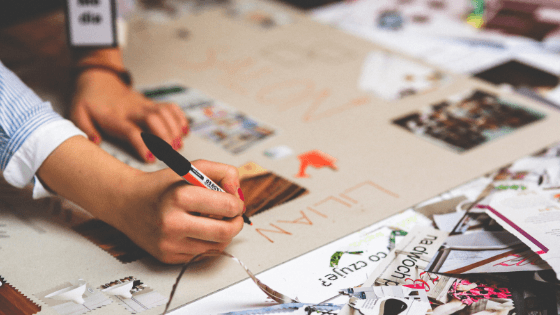5 Things Holding Back Workplace Creativity
Many of us assume that when it comes to creativity in the workplace it’s only necessary for those in a traditionally creative role such as graphic designers or those in branding, but the fact is creativity is required in every single role in an organisation.
Creativity gives us the ability to think of new ideas, improve upon existing ideas, enhance processes, and create solutions to problems.
So before I go on, do not for one second believe that your role does not involve an element of creativity. Because in one form or another, even if it is not obvious, you can be creative. It’s ingrained into many areas of our working lives without us truly realising we have the potential to ignite that creative ability.
Unfortunately, in school, we’re taught that creativity is only available to us in one format. Art. But the fact is creativity is everywhere, and in everything we do.
In fact, it is ultimately a human skill. You don’t see dolphins or pigeons coming up with the latest innovations in tech, you see humans. And so to believe you are not creative is to deny your human nature.
According to the World Economic Forum, the top three critical skills required in the workplace by 2020 will be complex problem-solving, critical thinking and creativity.
So why in a world where creativity is demanded of us, are we not giving it the time it deserves?
There are many reasons why we hold back our creativity, and here are five of the biggest areas.
No1. Fear
We are notoriously fearful about being creative.
During education, many of us are not praised for being creative. But creative ability can be found in all manner of subjects.
When we’re asked to be creative we have an immediate fear that our idea isn’t going to be good enough, or it’s going to be mocked by others. There is a vulnerability to creativity that many of us do not want to reveal to others.
Showing creativity is opening up a part of our brains that perhaps we hide-away in the workplace. Can we possibly open up our true thoughts and ideas to the rest of the team?
In a study by Adobe on the case for creativity in the workplace, it was revealed that 32% of employees don’t feel comfortable with creatively thinking in their career.
To feel creatively confident we have to fight these fears and ensure that in the workplace we feel that we can contribute and collaborate with others, without feeling that we may be dismissed by the group.
The inner judgement that comes from creative thinking is hard enough to overcome, let alone braving the critique of others.
Task;
To overcome your initial fears of creative thinking you have to increase your confidence. This can often boil down to the fact you may have imposter syndrome – ‘you don’t feel that you have the right to say anything because you don’t know anything’ – this is the type of critical dialogue which can play in our minds.
If this resonates with you, think about all the experience and knowledge you have and write it all down on a piece of paper. Sometimes physically viewing what you can bring to the table can make you realise your worth. You have the right to contribute and you should share your ideas with your team.

No2. Time
There’s no time to be creative!
When I’ve spoken to people about creativity they often say two things, “Oh, I’m not creative!”… or… “I don’t have the time to be creative.”
Because creativity cannot be measured in a quantifiable way, we often don’t give it the time it needs, especially in the workplace. How can an organisation possibly quantify working creatively on a project for an entire day? – It doesn’t appear commercially viable, so we don’t provide creative projects with the time they need.
Adobe found that 80% of UK employees feel pressured to be productive rather than creative at work.
While productivity has its place in the operations of the workplace, creativity is the skill that will help organisations to innovate.
If we simply keep our heads-down like good worker bees all the time, there will be no problem-solving or innovation taking place. Which ultimately means slow growth, and eventually even slower profits.
Organisations have to begin to make creative thinking a priority and provide not only time but also the opportunities for collaboration. Sharing ideas isn’t easy for everyone, it’s nerve-wracking opening up your ideas for all to see. Creating a time and space that feels safe for people to open up about their ideas can truly support everyone in the workplace to share their idea, no matter their position.
Task;
If your workplace wants to be more creative, commit to a creativity day or week. Share a problem with the team about what the organisation is looking for. It could be a new product, improve a service or streamline an operation. Whatever the organisational issue, share it with the team and then give them the week or day to come up with some ideas.
You can share your ideas either on a sticky-note wall or by getting everyone to stand up in front of the team and reveal their solution.

No3. Our Busy Lives
The trouble is, we’re all so busy, ‘being busy’, that we don’t allow ourselves the freedom to be creative.
We love filling our time, and as a society, we see ‘being busy’ as a badge of honour. In reality, you’re missing out, and as I’ve mentioned before, being a busy idiot only leads to burnout.
You only need to look at our children to see as adults where we get it wrong. We just don’t play enough or have fun. When was the last time you were just creative for the pure and utter joy of just creating?
Whether it’s drawing, playing an instrument, building something, or doing a little DIY. Creativity comes in all guises but we don’t give it the time.
Being busy isn’t good for us, it often means we’re unproductive, stressed and doing too much.
Only from getting out of our routine, getting in touch with our minds and relaxing can we come up with ideas and think of ways to innovate.
And the proof is there. How many times have you come up with an idea when you’re just having a shower or cooking dinner?
Task;
Block creative hobbies in your day just like you would an important meeting.
If you don’t practice creativity you won’t exercise the muscle to think creatively.
Find a time in your diary every week that is flexible where you can block out time to be creative.
That could be a hobby, it could be going for a walk. Anything that gets you anyway from routine and the mundane. Ensure to treat it as though it’s an important meeting, otherwise, you’ll never stick to it.

No4. Happiness
If we’re unhappy we don’t feel inspired.
Our happiness is linked to everything we do and affects everything we do. If we’re not feeling well or happy, we feel demotivated, uninspired and generally low. Which does nothing for our creative ability.
While creativity can spark joy, it can be a struggle to get there if we’re already not feeling well in ourselves.
It is scientifically proven that when we’re in a positive mood our brain is relaxed and therefore makes way for all the neural networks to run smoothly. This explains why many breakthroughs often come when the mind is at ease.
The same can be said if we’re not feeling happy in the workplace. We don’t feel like being creative, or don’t see the point in contributing to the creative input of the organisation.
In order to create to our best ability, we have to feel confident and happy with our own wellbeing.
Task;
There’s no special trick to instantly becoming happier, but there are methods that can be used to improve our mindset. Find a habit that puts a smile on your face no matter the situation.
This could be listening to a certain band, it could be doing some exercise or watching cat videos. Whatever your favoured fun go to it when you’re feeling low and need a pick-me-up.
Just the same way you’d break the glass if there was a fire. What can you do to damper down the negative thoughts in your head?

No5. Our Potential
We don’t realise our own potential.
Self-belief is hard to come by when we often prefer to be negative and critical. The world is full of bad news and comparison that our own confidence can be easily knocked, and we can end up feeling like just another cog in the wheel.
With younger teams especially, self-belief is a major factor in their creative ability.
How can we think of great ideas when we don’t even think we’re going to amount to anything?
Recognising this early is important for any employee development, as you can throw as much training and opportunities at them, but if they don’t have the confidence each will falter.
More than half of UK employees feel that creativity is being stifled by the educational system.
When we have a generation of young employees feeling unsure about their future, it is difficult for organisations to expect them to be creative.
None of us really know our true potential, and it often requires an outside guide to make us realise our skills and qualities.
Task;
If you’re struggling with your self-belief in the workplace gaining a mentor can often help you to not only improve your skills but also grow your confidence. Ask your leadership team to be partnered with a mentor, or discuss using an outside mentoring program that may support your development.

Key Points to Remember
Don’t forget that in order to build a creative workplace you have to embed these five core areas;
- Opportunity
- Encouragement
- Training
- Motivation
- Practice
If you need support with creativity in the workplace, contact me regarding my creativity workshop. Ideal for organisations looking to improve the creative confidence of their teams.



